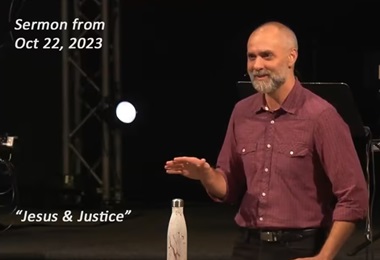
Benjamin Perrin spoke at Gracepoint Church in Surrey last Sunday morning.
Benjamin Perrin is a particularly busy man these days, between teaching law at UBC, spending time with his young family and promoting his new book, Indictment: The Criminal Justice System on Trial.
But he made time last weekend to speak (preach?) at Gracepoint Community Church in Surrey.
He began by outlining the many unjust elements of our criminal justice system, but also focused on the biblical understanding that has accompanied his transformation of thought on the issues.
At one point he joked, holding up a copy of the Bible: “This is the book I’m here to promote today, not the other one.”
(Editor’s note: I’ve watched a lot of sermons and Christian presentations over the years, but this one seems particularly timely, prophetic and biblical to me. Watch the video, linked to at the end, to get the full effect.)
Following is an article posted October 22 on his site: Jesus and Justice: A Christian Perspective is re-posted by permission and links to the video of his talk at Gracepoint.
Our society is facing a multitude of challenges. Crime is rising, homelessness is up, unregulated drug deaths are unabated and the vast majority of victims of crime don’t go to the authorities – they’ve given up on the system.
Trauma, substance abuse, mental health issues, poverty, homelessness and unemployment are often intertwined issues. Indigenous people are disproportionately impacted, in part because of the ongoing legacy of residential schools.
This was poignantly brought home to me in a handwritten letter that I received from an Indigenous man being incarcerated in BC. He wrote: “If you want to turn a man into an animal, put him in a cage without the resources to build himself back up.”
 In my book Indictment: The Criminal Justice System on Trial, I share harrowing stories of people whose lives have been devastatingly impacted by the system as well as policy ideas for compassionate, evidence-based approaches that would significantly help alleviate these challenges.
In my book Indictment: The Criminal Justice System on Trial, I share harrowing stories of people whose lives have been devastatingly impacted by the system as well as policy ideas for compassionate, evidence-based approaches that would significantly help alleviate these challenges.
A big part of the process of writing the book for me was my faith journey. I wanted to share a bit here about how being a follower of Jesus Christ has changed the way I approach these issues.
While listening to people share their stories for my research, I was also spending time each morning in prayer and reading the Bible. It was a very powerful to read about the life and teachings of Jesus and reflect on how he calls us to respond to the brokenness in our communities.
Here are just a few examples.
The parable of the Pharisee and the tax collector in Luke 18:10-14 serves as a reminder to approach these issues with humility. The Pharisee, confident of his own righteousness, looked down upon the tax collector. But the tax collector, recognizing his own sinfulness, sought God’s mercy. Jesus concluded that it was this man, rather than the Pharisee, who went home justified before God.
In the same way, the Bible teaches that we are all sinners and fall short of the glory of God (Romans 3:23). The wages of our sin is death, but the gift of God is eternal life in Christ Jesus (Romans 6:23). This understanding places us all on level ground at the cross – we’re no better than others, including people who have committed heinous crimes. That gets our heart in the right place of humility.
As we engage with social issues, it is important to do so with mercy, forgiveness, reconciliation, care, compassion, and respect. Jesus said, “Blessed are the merciful, for they will be shown mercy” (Matthew 5:7). Forgiveness is also a key element in our response.
As Jesus taught us to pray, “And forgive us our trespasses, as we forgive them that trespass against us” (Matthew 6:12). He also challenged those without sin to cast the first stone at the woman caught in adultery (John 8:7b), thereby teaching us not to judge but to demonstrate mercy and forgiveness.
Reconciliation is another important aspect of our response to social issues. Jesus urged us to settle matters quickly with our adversaries (Matthew 5:25). This means actively seeking to resolve conflicts and restore relationships.
Care and compassion should also define our interactions with those who are suffering. Throughout the Bible, we read that Jesus was filled with compassion. We’re called to the same. The parable of the Good Samaritan (Luke 10:25-37) teaches this clearly. The Samaritan showed compassion to the man who was attacked, bandaging his wounds and taking care of him, even though Jews and Samaritans were sworn enemies.
Jesus also said, “For I was hungry and you gave me something to eat, I was thirsty and you gave me something to drink, I was a stranger and you invited me in, I needed clothes and you clothed me, I was sick and you looked after me, I was in prison and you came to visit me” (Matthew 25:35-36). These acts of care and compassion for people not like us, the downcast and downtrodden, exemplify the love of Christ and should be the hallmark of our response to social issues.
Finally, as Christians, we should strive to do good and live as Jesus did (1 John 2:6). Jesus “went around doing good” (Acts 10:38). And as we do this, we should always be ready to give an answer for the hope we have, but do so with gentleness and respect (1 Peter 3:15). This is the Christ-like approach to addressing social issues, demonstrating mercy, forgiveness, reconciliation, care, compassion and respect in all that we do.
To watch Ben’s talk at Gracepoint Community Church click here.
 He is a professor at the Peter A. Allard School of Law at the University of British Columbia. He has served in the Prime Minister’s Office as in-house legal counsel and lead policy advisor on criminal justice and public safety. He was also a law clerk at the Supreme Court of Canada.
He is a professor at the Peter A. Allard School of Law at the University of British Columbia. He has served in the Prime Minister’s Office as in-house legal counsel and lead policy advisor on criminal justice and public safety. He was also a law clerk at the Supreme Court of Canada.
He is the author of Overdose: Heartbreak and Hope in Canada’s Opioid Crisis and other books.
He will be involved in two local events in November:
- ‘Indictment’ & Justice for Myles Gray: November 9, UBC Robson Square, Room C300
- Indictment: The Criminal Justice System on Trial (webinar): November 30
